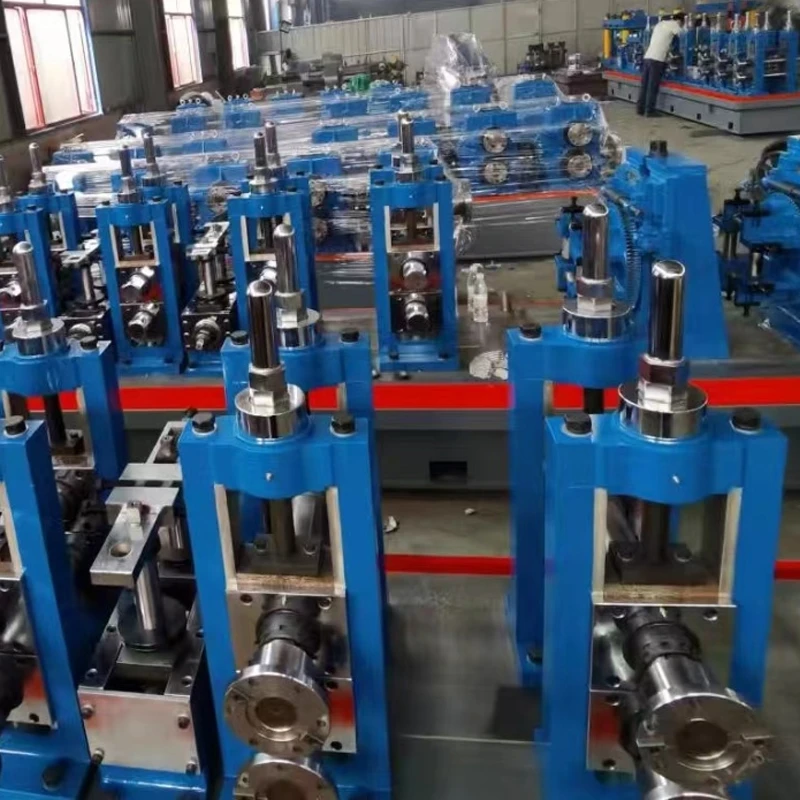roll forming line machine
The Significance of Roll Forming Line Machines in Modern Manufacturing
In the contemporary landscape of manufacturing, efficiency and precision are paramount. One technology that exemplifies these principles is the roll forming line machine. A critical asset in various industries, roll forming machines are designed for the mass production of metal components with consistent cross-sectional profiles. This article explores the functionality, applications, and advantages of roll forming line machines.
Understanding Roll Forming Machines
Roll forming is a continuous bending operation in which a long strip of metal, usually coiled steel, is passed through a sequence of roll sets. These roll sets progressively shape the metal into the desired profile. Unlike traditional metal forming processes, roll forming is highly efficient, allowing manufacturers to create complex shapes with minimal waste. The process involves several stages, which include feeding the metal, guiding it through the rollers, and cutting it to length at the end of the line.
Typically, roll forming line machines consist of several key components
1. Coil Decoiler - Unwinds the coil feedstock and feeds it into the rollers. 2. Roll Sets - A series of rolls that gradually shape the metal into the required profile. 3. Cut-off Mechanism - Cuts the formed product to the desired length after the profiling is completed. 4. Straightening Section - Aligns the finished product to ensure it is free from distortion. 5. Control System - Manages the operation of the entire line, ensuring precise adjustments and maintaining efficiency.
Applications of Roll Forming Line Machines
Roll forming line machines are used across various industries due to their versatility. Some common applications include
- Construction Industry Roll forming machines produce components such as roofing sheets, studs, tracks, and gutters. These products are vital in building frameworks and roofing systems, providing durability and structural integrity.
- Automotive Industry Roll forming is employed to manufacture parts like door frames, sergeant panels, and bumpers. The ability to create lightweight yet strong components is crucial for enhancing fuel efficiency and safety in vehicles.
- Electrical Appliances Many electrical appliances require metal parts that can withstand high temperatures and electrical currents. Roll forming machines help produce components like chassis and brackets, which are integral to housing electrical systems.
roll forming line machine

- Furniture Manufacturing The furniture industry uses roll-formed metal in the production of bed frames, shelving units, and decorative items, offering both functionality and aesthetic appeal
.Advantages of Roll Forming Line Machines
The benefits of incorporating roll forming line machines into manufacturing processes are numerous
1. Cost-Effective Production Roll forming allows for the high-volume production of parts with minimal waste, which translates into lower manufacturing costs. The continuous nature of the process means manufacturers can achieve significant savings over time.
2. High Precision and Consistency Roll forming delivers consistent results, ensuring that every piece produced meets the specified tolerances. This precision is essential in industries where component integrity is critical.
3. Design Flexibility Roll forming can accommodate a variety of designs and profiles, providing manufacturers with the flexibility to innovate and meet specific customer requirements.
4. Material Efficiency By utilizing the full width of the metal coil, roll forming minimizes scrap and maximizes material utilization, making it an environmentally responsible choice.
5. Reduced Labor Costs Automation in roll forming lines decreases the need for manual labor, leading to reductions in workforce costs and increasing productivity.
Conclusion
As industries continue to evolve and demand more efficient production processes, roll forming line machines stand out as an invaluable tool in modern manufacturing. Their ability to produce high-quality, consistent metal components efficiently and cost-effectively positions them as a preferred choice across various sectors. The advancements in technology also hint at a promising future for roll forming, with opportunities for integration with smart manufacturing practices, further enhancing productivity and innovation. Embracing this technology will undoubtedly lead to significant competitive advantages for manufacturers ready to adapt to the ever-changing market landscape.
-
High Frequency Straight Seam Welded Pipe Production Line|BzZhou Xinghua|Precision Welding&EfficiencyNewsJul.30,2025
-
High Frequency Straight Seam Welded Pipe Production Line - BzZhou Xinghua|Precision Engineering&EfficiencyNewsJul.30,2025
-
High-Frequency Straight Seam Welded Pipe Production Line-BzZhou Xinghua Machinery Equipment Manufacturing Co., LTD.NewsJul.30,2025
-
High-Frequency Straight Seam Welded Pipe Production Line-BzZhou Xinghua Machinery Equipment Manufacturing Co., LTD.|Precision Manufacturing, High EfficiencyNewsJul.30,2025
-
High Frequency Straight Seam Welded Pipe Production Line-BzZhou Xinghua Machinery Equipment Manufacturing Co., LTD.|Precision Steel Pipe Manufacturing&Industrial EfficiencyNewsJul.29,2025
-
High-Frequency Straight Seam Welded Pipe Production Line-BzZhou Xinghua Machinery Equipment Manufacturing Co., LTD.|Precision Steel Pipe Manufacturing&Industrial EfficiencyNewsJul.29,2025


